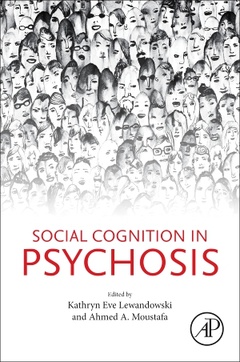Social Cognition in Psychosis
Coordonnateurs : Lewandowski Kathryn Eve, Moustafa Ahmed

Social Cognition in Psychosis combines current research on phenotypes, neurobiology, and existing evidence on the assessment and treatment of various forms of psychoses. The book presents various treatment options, including assessment approaches, tools and training methods that aid in the rehabilitation of patients with psychotic disorders. Social cognition is a set of psychological processes related to understanding, recognizing, processing and appropriately using social stimuli in one's environment. Individuals with psychotic disorders consistently exhibit impairments in social cognition. As a result, social cognition has been an important target for intervention, with recent efforts trying to enhance early recovery among individuals with psychotic disorders.
1. Characterization of social cognitive deficits on the schizophrenia-bipolar disorder spectrum: An overview of current evidence 2. Cognitive and social cognitive deficits in paranoia 3. Social cognition and schizotypy 4. Impact of social cognitive deficits on community functioning 5. Shared neural substrates of deficits in social cognition and negative symptoms in schizophrenia 6. Role of oxytocin in social cognition in psychosis spectrum disorders 7. Reward processing and social functioning in psychosis 8. Substance misuse and social cognition on the psychosis-spectrum: A bottom-up framework 9. Assessment of social cognition 10. Improving ecological validity in research on social cognition 11. Social cognitive interventions 12. Psychosocial interventions for social dysfunction in psychosis
Dr. Ahmed Moustafa is a Professor of Psychology and Computational Modeling at School of Psychology, Bond University, Gold Coast, Queensland, Australia. Prior to moving to Bond University, Ahmed was an associate professor in Psychology and Neuroscience at Marcs Institute for Brain, Behavior, and Development & School of Psychology, Western Sydney University. Ahmed is trained in computer science, psychology, neuroscience, and cognitive science. His early training took place at Cairo University in mathematics and computer science. Before joining Western Sydney University as a lab director, Ahmed spent 11 years in America working on several psychology and neuroscience projects. Ahmed conducts research on computational and neuropsychological studies of addict
- Provides an overview of social cognition in relation to various forms of psychotic disorders
- Includes assessment and treatment for social cognition dysfunction in psychoses
- Discusses the genetics and heritability theory of social cognitive dysfunction in psychosis
- Defines the neurobiology of social cognitive dysfunctions
Date de parution : 04-2019
Ouvrage de 345 p.
15x22.8 cm



